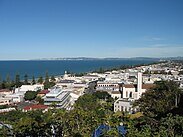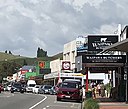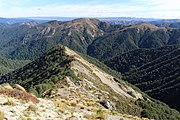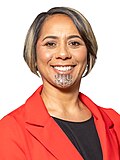Hawke's Bay
Hawke's Bay
Te Matau-a-Māui (Māori) | |
|---|---|
 Hawke's Bay within New Zealand | |
| Coordinates: 39°25′S 176°49′E / 39.417°S 176.817°E | |
| Country | New Zealand |
| Island | North Island |
| Seat | Napier |
| Government | |
| • Type | Regional council |
| • Body | Hawke's Bay Regional Council |
| • Chair | Hinewai Ormsby |
| • Deputy chair | Will Foley |
| Area | |
| • Land | 14,139.15 km2 (5,459.16 sq mi) |
| Highest elevation (Kaweka J) | 1,724 m (5,656 ft) |
| Population (June 2024)[2] | |
• Total | 185,400 |
| GDP | |
| • Total | NZ$ 11.385 billion (2021) (8th) |
| • Per capita | NZ$ 61,977 (2021) |
| ISO 3166 code | NZ–HKB |
| HDI (2022) | 0.921[4] very high · 12th |
| Website | www |
Hawke's Bay (Māori: Te Matau-a-Māui[5]) is a region on the east coast of New Zealand's North Island. The region is named for Hawke Bay, which was named in honour of Edward Hawke. The region's main centres are the cities of Napier and Hastings, while the more rural parts of the region are served by the towns of Waipukurau, Waipawa, and Wairoa.
Name
[edit]
Hawke's Bay is named for the bay to its east, Hawke Bay, which was named in honour of Edward Hawke, 1st Baron Hawke by Captain James Cook during one of his voyages along the coasts of New Zealand.
The Māori language name for Hawke's Bay is Te Matau-a-Māui (lit. the fishhook belonging to Māui). This name comes from a traditional story in which Maui lifted the islands of New Zealand from the waters. The story says that Hawke's Bay is the fishhook that Māui used, with Portland Island and Cape Kidnappers being the northern and southern barbs of the hook, respectively.[6]
Hawke's Bay is one of only two places in New Zealand with a possessive apostrophe in its name, the other being Arthur's Pass.[7] Captain Cook originally used an apostrophe in the name for the bay, but was inconsistent and wrote the name without an apostrophe a day later. Many New Zealanders spell the name without an apostrophe.[8]
History
[edit]
Early history
[edit]Bay whaling stations operated on the shores of the bay in the nineteenth century.[9]
Hawke's Bay Province was founded in 1858 as a province of New Zealand, after being separated from the Wellington Province following a meeting in Napier in February 1858. The Province was abolished in 1876 along with all other provinces in New Zealand. It was replaced with a Provincial District.
1931 earthquake
[edit]On February 3, 1931, Napier and Hastings were devastated by New Zealand's worst natural disaster, an earthquake measuring 7.9 on the Richter magnitude scale, which killed 256 people. Napier rebuilt and now the city is world-famous for its Art Deco buildings, and celebrates its heritage each February with the Art Deco Weekend. MTG Hawke's Bay, formerly Hawke's Bay Museum and Art Gallery, has an exhibition on the earthquake, its causes and impact.
Second World War
[edit]During the Second World War, the German submarine U-862 entered the waters around Napier undetected, surfacing by the Sound Shell. The submarine fired a torpedo at the Pukeko, a steamer leaving the Port of Napier, but narrowly missed.[10]
Cyclone Gabrielle
[edit]On the 13th and 14 February 2023, Cyclone Gabrielle caused extensive damage in Hawke's Bay as it passed over the North Island. Power, phone service and internet access was cut to over 16,000 properties when the main Redcliffe substation was damaged in floodwaters after the Tutaekuri River burst its banks. Downstream, 1,000 people were evacuated from low-lying plains surrounding the river, where significant parts of Taradale, Meeanee and Awatoto were submerged.
The floodwaters destroyed 4 bridges, including Redcliffe Bridge, a major crossing just south of Taradale. SH2 and SH51 bridges were heavily damaged, but did not collapse. A span of the Palmerston North-Gisborne Line crossing the Tutaekuri River also collapsed. The Ngaruroro River also breached its banks, flooding the town of Omahu where 20 people required evacuation via helicopter.
In Wairoa, the Wairoa River breached its banks, flooding approximately 15 percent of the town. Access to Wairoa was cut off after extensive damage on SH2's Mohaka River Bridge in the south, and landslides also closing SH2 to the north. Water supply in Central Hawke's Bay failed, and a mandatory evacuation was ordered for eastern Waipawa after the Waipara river rose to record levels. The total cost and damages are unknown at this time.[11][12]
Geography
[edit]The region is situated on the east coast of the North Island. It bears the former name of what is now Hawke Bay, a large semi-circular bay that extends for 100 kilometres from northeast to southwest from Māhia Peninsula to Cape Kidnappers.
The Hawke's Bay Region includes the hilly coastal land around the northern and central bay, the floodplains of the Wairoa River in the north, the wide fertile Heretaunga Plains around Hastings in the south, and a hilly interior stretching up into the Kaweka and Ruahine Ranges. The prominent peak Taraponui is located inland.
Five major rivers flow to the Hawke's Bay coast. From north to south, they are the Wairoa River, Mohaka River, Tutaekuri River, Ngaruroro River and Tukituki River. Lake Waikaremoana, situated in northern Hawke's Bay, roughly 35 km from the coast, is the largest lake in Hawke's Bay, the fourth largest in the North Island and the 16th largest in New Zealand.
The region has a hill with the longest place name in New Zealand, and the longest in the world according to the 2009 Guinness Book of Records. Taumatawhakatangihangakoauauotamateaturipukakapikimaungahoronukupokaiwhenuakitanatahu is an otherwise unremarkable hill in southern Hawke's Bay, not far from Waipukurau.[13]
-
Countryside
Demographics
[edit]Hawke's Bay Region covers 14,139.05 km2 (5,459.12 sq mi)[1] and had an estimated population of 185,400 as of June 2024,[2] 3.5 percent of New Zealand's population, with a population density of 13 people per km2. Around 74 percent of the region's population lives in the Napier-Hastings conurbation.
| Year | Pop. | ±% p.a. |
|---|---|---|
| 1991 | 138,342 | — |
| 1996 | 142,791 | +0.64% |
| 2001 | 142,950 | +0.02% |
| 2006 | 147,783 | +0.67% |
| 2013 | 151,179 | +0.33% |
| 2018 | 166,368 | +1.93% |
| 2023 | 175,074 | +1.03% |
| Source: [14][15] | ||

Hawke's Bay Region had a population of 175,074 in the 2023 New Zealand census, an increase of 8,706 people (5.2%) since the 2018 census, and an increase of 23,895 people (15.8%) since the 2013 census. There were 85,497 males, 89,055 females and 516 people of other genders in 63,735 dwellings.[16] 2.3% of people identified as LGBTIQ+. The median age was 40.4 years (compared with 38.1 years nationally). There were 34,641 people (19.8%) aged under 15 years, 30,249 (17.3%) aged 15 to 29, 76,266 (43.6%) aged 30 to 64, and 33,918 (19.4%) aged 65 or older.[14]
People could identify as more than one ethnicity. The results were 73.3% European (Pākehā); 28.6% Māori; 6.2% Pasifika; 6.5% Asian; 0.8% Middle Eastern, Latin American and African New Zealanders (MELAA); and 2.4% other, which includes people giving their ethnicity as "New Zealander". English was spoken by 96.5%, Māori language by 7.2%, Samoan by 1.9% and other languages by 8.2%. No language could be spoken by 1.9% (e.g. too young to talk). New Zealand Sign Language was known by 0.6%. The percentage of people born overseas was 17.5, compared with 28.8% nationally.
| Largest groups of overseas-born residents[17] | |
|---|---|
| Nationality | Population (2018) |
| England | 6,840 |
| Australia | 2,625 |
| India | 2,076 |
| Samoa | 1,665 |
| South Africa | 1,473 |
| Philippines | 942 |
| Scotland | 876 |
| China | 765 |
| Netherlands | 738 |
| United States | 657 |
The major local Māori tribe is Ngāti Kahungunu.
Religious affiliations were 33.6% Christian, 0.9% Hindu, 0.5% Islam, 3.3% Māori religious beliefs, 0.6% Buddhist, 0.5% New Age, 0.1% Jewish, and 1.7% other religions. People who answered that they had no religion were 52.5%, and 6.5% of people did not answer the census question.
Of those at least 15 years old, 20,490 (14.6%) people had a bachelor's or higher degree, 77,136 (54.9%) had a post-high school certificate or diploma, and 36,423 (25.9%) people exclusively held high school qualifications. The median income was $39,300, compared with $41,500 nationally. 12,315 people (8.8%) earned over $100,000 compared to 12.1% nationally. The employment status of those at least 15 was that 69,846 (49.7%) people were employed full-time, 18,585 (13.2%) were part-time, and 3,948 (2.8%) were unemployed.[14]
Below is a list of urban areas that contain more than 1,000 population.
| Urban area | Population (June 2024)[2] |
% of region |
|---|---|---|
| Napier | 67,500 | 36.4% |
| Hastings | 52,200 | 28.2% |
| Havelock North | 14,900 | 8.0% |
| Wairoa | 4,940 | 2.7% |
| Waipukurau | 4,850 | 2.6% |
| Waipawa | 2,540 | 1.4% |
| Clive | 2,120 | 1.1% |
Other towns and settlements in Hawke's Bay include:
Economy
[edit]The subnational gross domestic product (GDP) of Hawke's Bay was estimated at NZ$8.67 billion in the year to March 2019, 2.9% of New Zealand's national GDP. The regional GDP per capita was estimated at $50,251 in the same period. In the year to March 2018, primary industries contributed $1.14 billion (13.9%) to the regional GDP, goods-producing industries contributed $1.84 billion (22.3%), service industries contributed $4.56 billion (55.3%), and taxes and duties contributed $707 million (8.6%).[18]
Agriculture
[edit]The region is renowned for its horticulture, with large orchards and vineyards on the plains. In the hilly parts of the region sheep and cattle farming predominates, with forestry blocks in the roughest areas.
Hawke's Bay has 17,886 ha (44,200 acres) of horticultural land, the third largest area in New Zealand behind Canterbury and Marlborough. The largest crops by land area are apples (4,750 ha), wine grapes (3,620 ha), squash (3,390 ha), and peas and beans (1,360 ha).[19]
Wine
[edit]
The climate is dry and temperate, and the long, hot summers and cool winters offer excellent weather for growing grapes. Missionaries in the mid 19th century planted the first vines in Hawke's Bay and it is now an important place for full bodied red wines.[20] The wine region is the second largest after the Marlborough wine region, with 4,681 hectares (11,570 acres) of vineyards and 91 operating wineries in 2018.[21]
Aerospace
[edit]Hawke's Bay is home to Rocket Lab's Launch Complex 1, New Zealand's first orbital launch site, on Māhia Peninsula. Wairoa District is home to Space Coast New Zealand, a stretch of coastline from which space launches can be viewed.[22] Rocket Lab launches its Electron rockets several times a year, after its first successful launch of Humanity Star in January 2018.
Infrastructure
[edit]Air travel
[edit]Hawke's Bay is served by Hawke's Bay Airport (also known as Napier Airport). 452,000 travellers passed through the terminal in the 12 months to June 2013. This increased to 652,426 in the 12 months to June 2017.[23]
Hastings Aerodrome is a smaller uncontrolled airport in Bridge Pa near Hastings.
Roads
[edit]Inter-regional travel into and out of Hawke's Bay is served by State Highway 2 and State Highway 5, as well as the Taihape-Napier Road. State Highway 38 also connects inter-regionally, although it is less used due to being partially unsealed.
State Highway 2 enters the region coming south from Gisborne, connecting the East Cape region to Hawke's Bay. It continues through Nūhaka and then Wairoa, crossing over the Mohaka River near the Mohaka Viaduct. It then winds through the hills of northern Hawke's Bay, passing by Lake Tūtira. It meets the ocean and then passes through Whirinaki where it intersects with the end of State Highway 5. After cutting by Bay View, it passes by Hawke's Bay Airport as it enters Napier next to Pandora Pond. As it goes through Napier it is concurrent with State Highway 50 passing by Taradale. The Hawke's Bay Expressway forms the next section of the road as it crosses over the Tutaekuri and Ngaruroro rivers. The road then bisects Hastings and Flaxmere. The road continues through the Heretaunga Plains into Central Hawke's Bay, connecting the towns of Ōtāne, Waipawa, and Waipukurau. It then heads towards Takapau where it meets the other end of State Highway 50. After Takapau it heads into the Tararua District and through the towns of Norsewood and Dannevirke. State Highway 2 is the main route heading south from Napier-Hastings to get to major centres such as Palmerston North and Wellington.
State Highway 5 enters Hawke's Bay from the north-west as the Napier-Taupo Road. It serves as the main connection between Hawke's Bay and the main centres up north – including Auckland, Hamilton, Tauranga, Rotorua, and Taupō. It travels through the hilly interior of the region. It meets up with State Highway 2 after passing through Eskdale.
The Taihape-Napier Road serves as an inland route between Hawke's Bay and the Rangitikei and Ruapehu districts, creating a connection to the towns of Taihape, Waiouru, and Ohakune.
State Highway 50 starts in Ahuriri in Napier and after being concurrent with State Highway 2, splits off and connects the more interior sections of the region – including the settlements of Fernhill, Maraekakaho, Tikokino, Ongaonga, and Ashley Clinton. The road terminates at an intersection with State Highway 2 near Takapau.
Government
[edit]Regional
[edit]
The region is governed by Hawke's Bay Regional Council, which has its main office and council chamber in Napier. The council consists of eleven elected members and holds elections every three years. As of 26 October 2022 the councillors are:[24]
| Councillor | Constituency |
|---|---|
| Hinewai Ormsby (chair) | Ahuriri/Napier general |
| Will Foley (deputy chair) | Tamatea-Central Hawke's Bay general |
| Xan Harding | Heretaunga-Hastings general |
| Neil Kirton | Ahuriri/Napier general |
| Charles Lambert | Māui ki te Raki Māori |
| Jock Mackintosh | Heretaunga-Hastings general |
| Di Roadley | Wairoa general |
| Sophie Siers | Heretaunga-Hastings general |
| Hokianga Thompson | Māui ki te Tonga Māori |
| Jerf van Beek | Ngaruroro general |
| Martin Williams | Ahuriri/Napier general |
Proposal for a unitary authority
[edit]Between 2013 and 2015 the Local Government Commission considered amalgamating Hawke's Bay Regional Council, its four constituent territorial authorities (Napier City Council, Central Hawke's Bay District Council, Hastings District Council and Wairoa District Council), and the small parts of the Rangitikei District Council (the rural community of Ngamahanga) and Taupo District Council (the rural community of Taharua) that fall within the Hawke's Bay Region into a unitary authority that would hold all local decision-making powers for the region. This proposal was initiated by an application from a group called "A Better Hawke's Bay"[25] and followed the Government-led amalgamation of eight local authorities into the new Auckland Council in 2010 and a 2012 "prosperity study" that found a similar amalgamation in Hawke's Bay could save up to $25m per year.[26] A previous proposal to merge Napier and Hastings, though supported by Hastings residents, was defeated in a public referendum in 1999.[27]
The Local Government Commission released an initial proposal in November 2013.[28] After taking public submissions on the proposal, the Commission issued a final proposal in June 2015. The final proposal was that Hawke's Bay would be governed by a unitary council comprising a governing body (one mayor elected at-large and eighteen councillors elected across five wards) with subsidiary decision-making made by five local boards (each with six to nine elected members).[29]
Under the Local Government Act, the public had the right to demand a binding referendum on whether the amalgamation should proceed; such a demand would be valid if it was signed by at least 10% of the affected electors in one of the affected districts. Two days after the final proposal was issued, a valid referendum demand signed by more than 10% of the affected electors in the Rangitikei district was received[30] (there were only twelve affected electors in that district, therefore only two signatures were required to trigger the poll[27][31]). The referendum was held by post. Voting concluded on Tuesday 15 September 2015. Because 66% of electors opposed the change,[32] the proposal was defeated and did not progress further. Results broken down to the council level showed that only Hastings district electors favoured amalgamation (52% in favour). Napier (84% opposed), Wairoa District (88% opposed) and Central Hawke's Bay (58%) were opposed. Only four votes were returned from Rangitikei (two each way); no votes were returned from Taupo district.[32]
| Council area | For | Against | Informal | Blank | Total | Turnout | ||||
|---|---|---|---|---|---|---|---|---|---|---|
| Hastings District | 15,639 | 51.54% | 14,614 | 48.16% | 8 | 0.03% | 84 | 0.28% | 30,345 | 56.71%. |
| Napier City | 4,632 | 15.83% | 24,553 | 83.92% | 5 | 0.02% | 67 | 0.23% | 29,257 | 67.29%. |
| Central Hawke's Bay District | 2,629 | 41.55% | 3,684 | 58.23% | 2 | 0.03% | 12 | 0.19% | 6,327 | 65.50%. |
| Wairoa District | 457 | 11.62% | 3,465 | 88.12% | 0 | 0.00% | 10 | 0.25% | 3,932 | 69.35%. |
| Rangitikei District | 2 | 50.00% | 2 | 50.00% | 0 | 0.00% | 0 | 0.00% | 4 | 33.33%. |
| Taupō District | 0 | 0.00% | 0 | 0.00% | 0 | 0.00% | 0 | 0.00% | 0 | 0.00% |
| Total | 23,359 | 33.43% | 46,318 | 66.30% | 15 | 0.02% | 173 | 0.25% | 69,865 | 62.18% |
Sub-regional
[edit]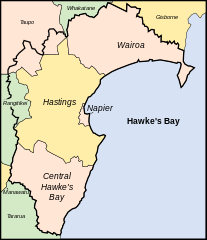
Government at the level below regional is organised into territorial authorities, consisting of Hastings District, Wairoa District, Central Hawke's Bay District, and Napier City. The localities of Taharua in the Taupo District and Ngamatea in the Rangitikei District are also within the boundaries of the region. It does not include the Tararua District, Dannevirke, Woodville or Norsewood, which have been under the Manawatū-Whanganui Regional Council (also known as Horizons Regional Council) since the 1989 local government reforms.[33][34]
| District | Mayor | Year Elected |
|---|---|---|
| Central Hawke's Bay | Alex Walker | 2016 |
| Hastings | Sandra Hazlehurst | 2017 |
| Napier | Kirsten Wise | 2019 |
| Wairoa | Craig Little | 2013 |
-
Sandra Hazlehurst
-
Craig Little
National
[edit]
Hawke's Bay is covered by five general electorates — namely Napier, Tukituki, Wairarapa, Rangitīkei, and Taupō.[35] The bulk of the region is contained within the Napier and Tukituki electorates, the former comprising most of the northern part of the region (including Napier and Wairoa), whilst the latter comprises much of the central parts of the region and the area around Hastings, including Havelock North and Clive. Wairarapa, which extends across parts of Greater Wellington and Manawatū-Whanganui, includes much of Central Hawke's Bay District, including Waipukurau and Waipawa. The Rangitīkei and Taupō electorates do not contain much of any population within the region.
Napier and Tukituki are often called 'bellwether' electorates.[36][37] Since the introduction of Mixed-Member Proportional elections in New Zealand, both electorates have been held by both Labour and National members of parliament, often shifting in a way similar to that of the nation as a whole.
Hawke's Bay is also covered by three Māori electorates — namely Ikaroa-Rāwhiti, Waiariki, and Te Tai Hauāuru.[38] The vast majority of the population of the region is within the Ikaroa-Rāwhiti electorate.
| Electorate | Main Centres | MP | First Elected | |
|---|---|---|---|---|
| Napier | Napier, Wairoa | Kate Nimon | 2023 | |
| Tukituki | Hastings, Havelock North, Clive | Catherine Wedd | 2023 | |
| Wairarapa | Waipukurau, Waipawa | Mike Butterick | 2023 | |
| Ikaroa-Rāwhiti | All | Cushla Tangaere-Manuel | 2023 | |
-
Catherine Wedd
-
Katie Nimon
-
Mike Butterick
-
Cushla Tangaere-Manuel
Culture and lifestyle
[edit]Hawke's Bay Anniversary Day
[edit]Hawke's Bay Anniversary Day is an annual day of celebration held on the Friday before Labour Day. It is celebrated throughout the old provincial boundaries of Hawke's Bay.

Media
[edit]The region is served by a variety of radio stations including Radio Kahungunu, The Hits 89.5, More FM, access station Radio Hawke's Bay (formally Radio Kidnappers) and local station Bay FM. As well, most of the national commercial and non-commercial operators have transmitters covering the region.


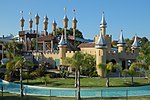
Parks and nature
[edit]Hawke's Bay is home to numerous parks, forests, beaches and various other natural attractions.
Napier and Hastings are home to many parks, with major parks including Cornwall, Frimley, and Windsor Parks in Hastings, and Anderson Park, Park Island, Taradale Park and the Botanical Gardens in Napier.
Located in Windsor Park is Splash Planet, an amusement and water park that is open in the summer.
Cape Kidnappers, a headland at the south-eastern extremity of Hawke Bay, is a popular tourist attraction. The cape has been identified as an Important Bird Area due to being a breeding site for over 6500 pairs of Australasian gannets.
Food
[edit]The Hawke's Bay wine region produces some of New Zealand's finest wines, celebrated together with local cuisine twice a year with the Food And Wine Classic festivals. These take place over several weekends in winter and ten days in summer, attracting thousands of visitors, many from overseas.[39]
Music
[edit]Napier is home to the Mission Concert held early each year since 1993. The event, held at the Mission Estate Winery in Taradale, has attracted performers such as Kenny Rogers, Elton John, Shirley Bassey, Rod Stewart, The B-52's, Belinda Carlisle, Ray Charles, and Eric Clapton. The 2009 concert attraction was to be Lionel Richie, but the concert was cancelled because of rain.
UK music artist Tycho Jones was staying in Hastings, Hawkes Bay when he was inspired to write the track Don't Be Afraid, produced by Jonathan Quarmby.[40]
Sport
[edit]The Hawke's Bay Rugby Union's representative team, the Magpies, plays in New Zealand's annual professional domestic rugby union competition, the Mitre 10 Cup. The team represents the Hawke's Bay Region in provincial representative rugby, and draws its players from the constituent clubs who are affiliated to the provincial union. The team play their home matches in McLean Park in Napier. Players representing Hawke's Bay are also eligible to play for the Hurricanes in the annual transnational Super Rugby competition. Hawke's Bay has produced a number of All Blacks.
The Hawke's Bay Hawks compete in the New Zealand National Basketball League.
Seismicity
[edit]Hawke's Bay is one of the most seismically active regions in New Zealand and has experienced many large and often damaging earthquakes. More than 50 damaging earthquakes have been recorded in the region since the 1800s.
| Date | Location | Magnitude (ML) | Depth | Fatalities | More information |
|---|---|---|---|---|---|
| 8 Jul 1843 | 25 km west of Tikokino | 7.6 | 12 km | 2 | [41] |
| 22 Feb 1863 | Waipukurau | 7.5 | 25 km | 1863 Hawke's Bay earthquake[42] | |
| 14 Sep 1875 | Māhia Peninsula | 5.8 | 25 km | [43] | |
| 9 Aug 1904 | Pōrangahau | 7.0 | 16 km | [44] | |
| 28 Jun 1921 | Kaweka Forest Park | 6.7 | 80 km | [45] | |
| 12 Feb 1930 | Pōrangahau | 6.2 | 33 km | [46] | |
| 3 Feb 1931 | 20 km north of Napier | 7.8 | 20 km | 256 | 1931 Hawke's Bay earthquake[47] |
| 3 Feb 1931 | 25 km north east of Napier | 5.8 | 25 km | [48] | |
| 8 Feb 1931 | Wairoa | 6.4 | 60 km | [49] | |
| 13 Feb 1931 | 50 km east of Napier | 7.3 | 30 km | [50] | |
| 5 May 1932 | 50 km east of Napier | 5.9 | 12 km | [51] | |
| 16 Sep 1932 | Wairoa | 6.9 | 12 km | [52] | |
| 5 Mar 1934 | Pongaroa | 7.2 | 12 km | [53] | |
| 15 Mar 1934 | Wairoa | 6.3 | 25 km | [54] | |
| 26 Feb 1940 | Hastings | 6.0 | 25 km | [55] | |
| 1 Mar 1950 | Lake Waikaremoana | 5.8 | 60 km | [56] | |
| 10 Feb 1951 | Pōrangahau | 6.2 | 33 km | [57] | |
| 6 Oct 1980 | Hastings | 5.7 | 30 km | [58] | |
| 19 Feb 1990 | Pōrangahau | 6.2 | 34 km | [59] | |
| 13 May 1990 | Pōrangahau | 6.4 | 30 km | [60] |
References
[edit]- ^ a b "ArcGIS Web Application". statsnz.maps.arcgis.com. Retrieved 7 October 2024.
- ^ a b c "Aotearoa Data Explorer". Statistics New Zealand. Retrieved 26 October 2024.
- ^ "Regional gross domestic product: Year ended March 2022". Statistics New Zealand. 24 March 2023. Retrieved 4 April 2023.
- ^ "Sub-national HDI – Area Database – Global Data Lab". hdi.globaldatalab.org. Retrieved 18 February 2023.
- ^ Pollock, Kerryn. 'Hawke’s Bay region – Overview'. Te Ara – the Encyclopedia of New Zealand. (accessed 9 November 2017)
- ^ "Te Matau-a-Māui: The hook of Māui | Hawke's Bay NZ". www.hawkesbaynz.com. Retrieved 30 October 2023.
- ^ Fowler, Michael (26 October 2019). "Hawke's Bay named after Cook's boss". The New Zealand Herald. Retrieved 29 January 2024.
- ^ Pollock, Kerryn. "Hawke's Bay region". Te Ara: The Encyclopedia of New Zealand. Retrieved 29 January 2024.
- ^ Don Grady (1986) Sealers & whalers in New Zealand waters, Auckland, Reed Methuen, p.150. ISBN 0474000508
- ^ Hunt, Megan (28 September 2016). "Memorial unveiled to mark German submarine's Napier visit". Stuff. Retrieved 31 October 2023.
- ^ "Cyclone Gabrielle: Town cut off as Wairoa River bursts its banks, flooding homes of about half its population". 14 February 2023.
- ^ "Hawke's Bay RSE workers rescued after 10 hours trapped on roofs amid flood waters". 4 January 2024.
- ^ "Town with the longest name in New Zealand". www.newzealand.com. Retrieved 27 November 2023.
- ^ a b c "Totals by topic for individuals, (RC, TALB, UR, SA3, SA2, Ward, Health), 2013, 2018, and 2023 Censuses". Stats NZ - Tatauranga Aotearoa - Aotearoa Data Explorer. Hawke's Bay Region (06). Retrieved 3 October 2024.
- ^ "2001 Census: Regional summary". archive.stats.govt.nz. Retrieved 28 April 2020.
- ^ "Totals by topic for dwellings, (RC, TALB, UR, SA3, SA2, Ward, Health), 2013, 2018, and 2023 Censuses". Stats NZ - Tatauranga Aotearoa - Aotearoa Data Explorer. Retrieved 3 October 2024.
- ^ "Birthplace (detailed), for the census usually resident population count, 2006, 2013, and 2018 Censuses (RC, TA, SA2, DHB)". Statistics New Zealand.
- ^ "Regional gross domestic product: Year ended March 2019 | Stats NZ". www.stats.govt.nz. Retrieved 21 May 2020.
- ^ "Fresh Facts: New Zealand Horticulture" (PDF). Plant & Food Research. 2018. ISSN 1177-2190.
- ^ The-Wine-Library Archived 5 October 2011 at the Wayback Machine Short Description of wine in Hawkes Bay
- ^ "New Zealand Winegrowers Annual Report 2018" (PDF). New Zealand Winegrowers. 2018. Retrieved 5 August 2019.
- ^ "Space Coast New Zealand". Wairoa District Council. Retrieved 8 August 2019.
- ^ "Record Number of Passengers through Hawke's Bay Airport | Hawke's Bay Airport". www.hawkesbay-airport.co.nz. Retrieved 31 October 2023.
- ^ "Hawke's Bay council elects youngest and first wahine chair". Inside Government NZ. JSL Media. 26 October 2022. Retrieved 26 October 2022.
- ^ "Decisions and Determinations | Local Government Commission". www.lgc.govt.nz. Retrieved 27 April 2021.
- ^ "Hawke's Bay amalgamation could save $25m". Stuff. 3 September 2012. Archived from the original on 27 April 2021. Retrieved 27 April 2021.
- ^ a b Laing, Doug. "Close to quarter on roll cast votes". New Zealand Herald. Archived from the original on 27 April 2021. Retrieved 27 April 2021.
- ^ Henderey, Simon (26 November 2013). "Amalgamation plan revealed". New Zealand Herald. Archived from the original on 27 April 2021. Retrieved 27 April 2021.
- ^ Local Government Commission (June 2015). "Hawke's Bay Local Government Reorganisation: Final Proposal" (PDF). Archived (PDF) from the original on 29 January 2021. Retrieved 27 April 2021.
- ^ "Poll process update for Hawke's Bay reorganisation proposal | Local Government Commission". www.lgc.govt.nz. Retrieved 27 April 2021.
- ^ Sharpe, Marty (27 November 2013). "Two people could force council amalgamation poll". Stuff. Archived from the original on 3 December 2013. Retrieved 27 April 2021.
- ^ a b electionz.com (18 September 2015). "Hawke's Bay Reorganisation Poll". www.scoop.co.nz. Archived from the original on 30 October 2020. Retrieved 27 April 2021.
Four votes from Rangitikei were received in the referendum, with turnout from that being 33.33% showing that the total number of affected electors was approximately 12.
- ^ Pollock, Kerryn (15 November 2012). "Hawke's Bay region – Local government boundary changes". Te Ara – the Encyclopedia of New Zealand.
- ^ Pollock, Kerryn (15 November 2012). "Hawke's Bay region – Government, education and health". Te Ara – the Encyclopedia of New Zealand.
- ^ "Stats NZ Geographic Data Service". datafinder.stats.govt.nz. Retrieved 28 October 2023.
- ^ "Hawke's Bay Today to host three election candidate evenings as campaign heats up". The New Zealand Herald. 28 October 2023. Retrieved 28 October 2023.
- ^ Sharpe, Marty (22 August 2023). "National leads polling in bellwether Napier, but 23 per cent of voters undecided". Stuff. Retrieved 28 October 2023.
- ^ "Stats NZ Geographic Data Service". datafinder.stats.govt.nz. Retrieved 28 October 2023.
- ^ Harfield, Ruby (13 November 2017). "Newcomers flock to 10-day Hawke's Bay Food and Wine Classic F.A.W.C!". Hawke's Bay Today. Retrieved 8 August 2019.
- ^ Sawyer, Jack (9 May 2020). "Tycho Jones delivers on single-run finale with 'Don't Be Afraid' & Tychonaut EP". Musical Motif.
- ^ "A magnitude 7.6 earthquake occurred 35 km east of Taihape, New Zealand on Sat Jul 8 1843 5:09 PM. The quake was 12 kilometres deep and the shaking was severe close to the quake".
- ^ "A magnitude 7.5 earthquake occurred Within 5 km of Waipukurau, New Zealand on Mon Feb 23 1863 12:39 AM. The quake was 25 kilometres deep and the shaking was severe close to the quake".
- ^ "A magnitude 5.8 earthquake occurred 35 km south of Gisborne, New Zealand on Tue Sep 14 1875 11:39 PM. The quake was 25 kilometres deep and the shaking was strong close to the quake".
- ^ "A magnitude 7.0 earthquake occurred 20 km south-west of Porangahau, New Zealand on Tue Aug 9 1904 10:20 AM. The quake was 16 kilometres deep and the shaking was severe close to the quake".
- ^ "A magnitude 6.7 earthquake occurred 45 km north-west of Napier, New Zealand on Wed Jun 29 1921 1:28 AM. The quake was 80 kilometres deep and the shaking was severe close to the quake".
- ^ "A magnitude 6.2 earthquake occurred 10 km south-west of Porangahau, New Zealand on Wed Feb 12 1930 6:22 PM. The quake was 33 kilometres deep and the shaking was severe close to the quake".
- ^ "GeoNet News". info.geonet.org.nz.
- ^ "A magnitude 5.8 earthquake occurred 20 km north of Napier, New Zealand on Tue Feb 3 1931 8:41 PM. The quake was 25 kilometres deep and the shaking was strong close to the quake".
- ^ "A magnitude 6.4 earthquake occurred 15 km south-east of Wairoa, New Zealand on Sun Feb 8 1931 1:44 PM. The quake was 60 kilometres deep and the shaking was severe close to the quake".
- ^ "A magnitude 7.3 earthquake occurred 50 km south of Wairoa, New Zealand on Fri Feb 13 1931 1:27 PM. The quake was 30 kilometres deep and the shaking was severe close to the quake".
- ^ "A magnitude 5.9 earthquake occurred 45 km east of Napier, New Zealand on Thu May 5 1932 7:54 PM. The quake was 12 kilometres deep and the shaking was strong close to the quake".
- ^ "A magnitude 6.9 earthquake occurred 15 km north-east of Wairoa, New Zealand on Fri Sep 16 1932 1:25 AM. The quake was 12 kilometres deep and the shaking was severe close to the quake".
- ^ "A magnitude 7.2 earthquake occurred 5 km east of Pongaroa, New Zealand on Mon Mar 5 1934 11:46 PM. The quake was 12 kilometres deep and the shaking was severe close to the quake".
- ^ "A magnitude 6.3 earthquake occurred 30 km south-west of Wairoa, New Zealand on Thu Mar 15 1934 10:46 PM. The quake was 25 kilometres deep and the shaking was severe close to the quake".
- ^ "A magnitude 6.0 earthquake occurred 30 km north-west of Hastings, New Zealand on Mon Feb 26 1940 6:16 PM. The quake was 25 kilometres deep and the shaking was strong close to the quake".
- ^ "A magnitude 5.8 earthquake occurred 45 km north-west of Wairoa, New Zealand on Wed Mar 1 1950 6:58 AM. The quake was 60 kilometres deep and the shaking was moderate close to the quake".
- ^ "A magnitude 6.2 earthquake occurred 35 km east of Porangahau, New Zealand on Sat Feb 10 1951 3:27 PM. The quake was 33 kilometres deep and the shaking was strong close to the quake".
- ^ "A magnitude 5.7 earthquake occurred 5 km south of Hastings, New Zealand on Mon Oct 6 1980 3:32 AM. The quake was 30 kilometres deep and the shaking was strong close to the quake".
- ^ "A magnitude 6.2 earthquake occurred 20 km north-east of Pongaroa, New Zealand on Mon Feb 19 1990 6:34 PM The quake was 34 kilometres deep and the shaking was severe close to the quake".
- ^ "A magnitude 6.4 earthquake occurred 15 km south-west of Porangahau, New Zealand on Sun May 13 1990 4:23 PM. The quake was 30 kilometres deep and the shaking was severe close to the quake".
External links
[edit]- Hawke's Bay Regional Council
- Official Hawke's Bay Tourism Portal
- Official Newcomers website – free information service for newcomers to Hawke's Bay
- "Hawke's Bay Province and Provincial District". An Encyclopaedia of New Zealand, edited by A. H. McLintock, Wellington, 1966

